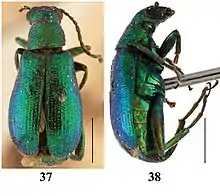Rhaebus (beetle)
Rhaebus (from the Greek: ῥαιβός curved) is a genus of metallic bean weevils in the subfamily Bruchinae, and the only member of the tribe Rhaebini.[2][3][4] It is restricted to the Palearctic region.[4]
| Rhaebus | |
|---|---|
 | |
| Rhaebus solskyi | |
| Scientific classification | |
| Domain: | Eukaryota |
| Kingdom: | Animalia |
| Phylum: | Arthropoda |
| Class: | Insecta |
| Order: | Coleoptera |
| Infraorder: | Cucujiformia |
| Family: | Chrysomelidae |
| Subfamily: | Bruchinae |
| Tribe: | Rhaebini Blanchard, 1845[1] |
| Genus: | Rhaebus Fischer von Waldheim, 1824 |
| Type species | |
| Rhaebus gebleri Fischer von Waldheim, 1824 | |
Appearance
Rhaebus beetles are small, measuring between 3-5 millimetres in length, and are metallic in colour, which is rare in members if the Bruchinae subfamily. Their bodies are elongated in shape, and the antennae vary.[5]
Diet and life cycle
Rhaebus beetles feed exclusively on plants of the genus Nitraria, where their young also develop.[5][6][7]
Taxonomic history
The genus was first described in 1824 by Gotthelf Fischer von Waldheim in his book Entomographie de la Russie.[8] He described it with only one species, Rh. gebleri, making the genus monotypic.[5]
Species creation & synonymy
- 1845: Rhaebus fischeri mentioned by Jean T. Lacordaire, not described.
- 1845: Rhaebus mannerheimi named and described by Victor Motschulsky.
- 1866: Rhaebus sagroides named and described by Simon Martinovitch Solsky.
- 1867: Rhaebus beckeri named and described by Christian W. L. E. Suffrain. The original description (in German) is available from Wikimedia Commons.
- 1869: Rh. beckeri and Rh. sagroides synonymized with Rh. mannerheimi by Victor Motchulsky.
- 1879: Rhaebus solskyi proposed by Ernst Gustav Kraatz.
- 1939: Rhaebus komarovi named and described by Fyodor Lukyanovich.
- 1973: Rhaebus lukjanovitschi named and described by Margarita Ervandovna Ter-Minassian.
- 2000: Rhaebus amnoni named and described by Igor Lopatin and Vladimir Chikatunov, after Dr. Amnon Freidberg.
- 2022: Rh. amnoni, Rh. komarovi, and Rh. mannerheimi synonymized with Rh. gebleri by Andrei Legalov.
Species
Since a taxonomic review in August 2022, Rhaebus has three species:[6][9]
- Rhaebus gebleri Fischer von Waldheim, 1824 (=Rh. mannerheimi, Rh. amnoni, Rh. komarovi) - Found in Turkey, Israel, Southern Russia, Kazakhstan, Mongolia, Inner Mongolia (China), and Kyrgyzstan.
- Rhaebus lukjanovitschi Ter-Minassian, 1973 - Found in Mongolia and Inner Mongolia (China)
- Rhaebus solskyi Kraatz, 1879 - Found in Kazakhstan, Southern Russia, Mongolia, and China.
References
- Bouchard, Patrice; Bousquet, Yves; Davies, Anthony E.; Alonso-Zarazaga, Miguel A.; Lawrence, John F.; Lyal, Chris H. C.; Newton, Alfred F.; Reid, Chris A. M.; Schmitt, Michael; Ślipiński, S. Adam & Smith, Andrew B. T. (2011). "Family-group names in Coleoptera (Insecta)". ZooKeys (88): 1–972. doi:10.3897/zookeys.88.807. PMC 3088472. PMID 21594053.
- "Bruchinae". uk beetles. Retrieved 2022-09-15.
- "Tribe Rhaebini". iNaturalist. Retrieved 2022-09-15.
- Vencl, Fredric & Leschen, Richard. (2014). Vencl FV & Leschen RAB (2014) Chapter 2.7.6. Criocerinae Lattreille 1807. pp. 237- 242 In: Leschen RAB & Beutel RG (eds). Handbook of Zoology, Coleoptera Volume 3: Morphology and Systematics (Phytophaga). Walter de Gruyter, Berlin.
- Kingsolver, John M. & Pfaffenberger, G. S. (1980). "Systematic relationship of the genus Rhaebus (Coleoptera, Bruchidae)". Proceedings of the Entomological Society of Washington. 82: 293–311. archive.org
- Bouchard, Patrice (2014-12-17). The Book of Beetles: A Life-Size Guide to Six Hundred of Nature's Gems. University of Chicago Press. ISBN 978-0-226-08289-9.
- Lopatin, Igor & Chikatunov, Vladimir (2000-07-31). "Rhaebus amnoni n. sp. – The first representative of the Central-Asian genus Rhaebus in Israel" (PDF). Mitteilungen des Internationalen Entomologischen Vereins. 25: 31–34 – via Zobodat.
- Fischer von Waldheim, Gotthelf (1824). Entomographia Imperii Russici. Auctoritate Societatis Cæsareæ Mosquensis Naturæ Scrutatorum: Cum XL tabulis æneis. 2 (in French). Semen.
- Legalov, Andrei A. (2022-08-12). "Review of the genus Rhaebus Fischer von Waldheim, 1824 (Coleoptera: Chrysomelidae: Bruchinae)". Ecologica Montenegrina. 55: 1–16. doi:10.37828/em.2022.55.1. ISSN 2336-9744. S2CID 251543798.